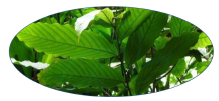

海南暗罗根克罗烷型二萜化学成分研究
收稿日期: 2017-05-23
修回日期: 2017-06-10
网络出版日期: 2017-06-23
基金资助
国家自然科学基金(Nos.81160391,21362009,81360478)、国家国际科技合作专项(No.2014DFA40850)、创新发展团队(No.IRT-16R19)、海南省自然科学基金创新研究团队(No.2016CXTD007)及海南省自然科学基金(No.20162031)资助项目.
Clerodane Diterpenes from the Roots of Polyalthia laui
Received date: 2017-05-23
Revised date: 2017-06-10
Online published: 2017-06-23
Supported by
Project supported by the National Natural Science Foundation of China (Nos.81160391,21362009,81360478),the International S&T Cooperation Program of China (No.2014DFA40850),the Program for Innovative Research Team in University (No.IRT-16R19),the Hainan Provincal Natural Science Foundation of Innovatie Research Team Project (No.2016CXTD007) and the Natural Science Foundation of Hainan Province (No.20162031).
对海南暗罗根化学成分进行系统研究,分离得到5个克罗烷型二萜类化合物.根据它们的NMR和HRMS数据,鉴定它们的结构分别为:(4→2)重排-2,13-二甲酰基-克罗烷-2,12E-二双键-15-甲酯(1)、克罗烷-3,12E-二双键-15,16-二甲酸(2)、14,15-降二碳克罗烷-3-双键-2,13-二酮(3)、克罗烷-3,13Z-二双键-15,16-内酯(4)、16-羟基克罗烷-3,13Z-二双键-15,16-内酯(5).其中化合物1~2为新化合物.化合物1~5的体外细胞毒活性筛选结果表明,它们对4种肿瘤细胞株(Hela、A549、MCF-7和HL-60)均显示出了一定的体外生长抑制活性,其IC50值范围为13.22~37.16 μmol/L.

李小宝 , 陈光英 , 邵泰明 , 宋小平 , 韩长日 , 余章昕 . 海南暗罗根克罗烷型二萜化学成分研究[J]. 有机化学, 2017 , 37(10) : 2763 -2766 . DOI: 10.6023/cjoc201705035
Five clerodane diterpenes were isolated from the roots of Polyalthia laui during a systematic phytochemical investigation. Their structures were elucidated by the NMR and HRMS data as methyl (4→2)-abeo-2,13-diformyl-cleroda-2,12E-dien-15-ate (1), (E)-ent-cleroda-3,12-diene-15,16-dioic acid (2), 14,15-dinorclerod-3-ene-2,13-dione (3), solidagolactone (4), and 16-hydroxy-3,13Z-kolavadien-16,15-olide (5). Among them, compounds 1~2 are new clerodane diterpenes. Biological evaluation of compounds 1~5 against human Hela, A549, MCF-7 and HL-60 human cancer cell lines showed that all com-pounds displayed moderate cytotoxicities against various human cancer cell lines with IC50 ranged from 13.22 to 37.16 μmol/L.

Key words: Polyalthia laui; clerodane diterpenes; cytotoxicities
[1] Padmaa, M. P.; Khosa, R. L. J. Pharm. Res. 2009, 2, 594.
[2] Kirtikar, K. R.; Basu, B. D. Indian Medicinal Plants, International Book Distributors, Dehradun, 1995, 562.
[3] Goyal, M. M.; Gupta, A. Indian J. Pharmacol. 1987, 19, 216.
[4] Panthama, N.; Chang, F. R.; Lee, T. H.; Panthama, N. J. Nat. Prod. 2010, 73, 1366.
[5] Phadnis, A. P.; Patwardhan, S. A.; Dhaneshwar, N. N.; Tavale, S. S.; Row, T. N. G. Phytochemistry 1988, 27, 2899.
[6] Lee, T. H.; Wang, M. J.; Chen, P. Y.; Wu, T. Y.; Wen, W. C.; Tsai, F. Y. J. Nat. Prod. 2009, 72, 1960.
[7] Li, X. B.; Song, X. P.; Chen, G. Y.; Han, C. R.; Chen, W. H.; Zheng, C. J.; Song, X. M. Chin. J. Org. Chem. 2013, 33, 1333(in Chinese). (李小宝, 宋小平, 陈光英, 韩长日, 陈文豪, 郑彩娟, 宋鑫明, 有机化学, 2013, 33, 1333.)
[8] Yu, Z. X.; Fu, Y. H.; Chen, G. Y.; Song, X. P.; Han, C. R.; Li, X. B.; Song, X. M.; Wu, A. Z.; Chen, S. C. Fitoterapia 2016, 111, 36.
[9] Bohlmann, F.; Singh, P.; Singh, R. K.; Joshi, K. C.; Jakupovic, J. Phytochemistry 1985, 24, 1114.
[10] Kijjoa, A.; Pinto, M. M. M.; Pinto, P. M. M.; Herz, W. Phytochemistry 1993, 34, 457.
[11] He, H. P.; Shen, Y. M.; Zuo, G. Y.; Yang, X. S.; Hao, X. J. Helv. Chim. Acta 2003, 86, 3187.
[12] Hara, N.; Asaki, H.; Fujimoto, Y.; Gupta, Y. K.; Singh, A. K. Phytochemistry 1995, 38, 189.
[13] Mosmann, T. J. Immunol. Methods 1983, 65, 55.
/
| 〈 |
|
〉 |